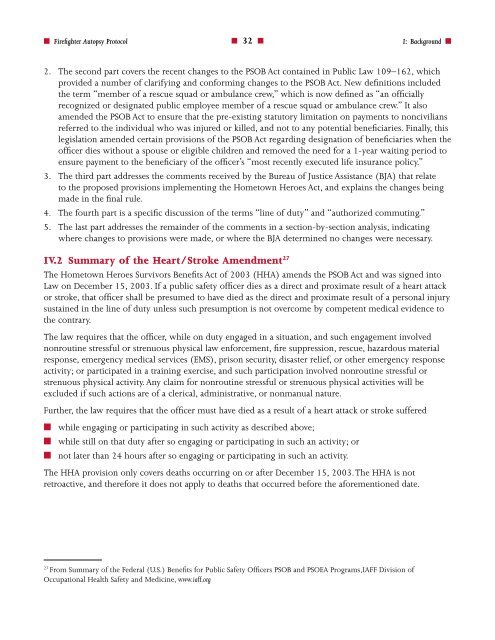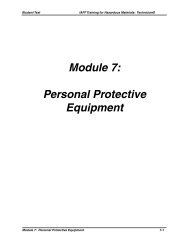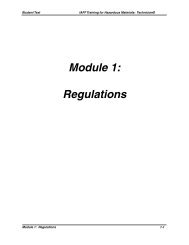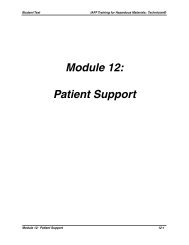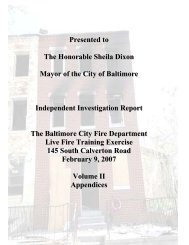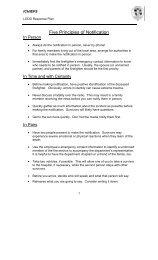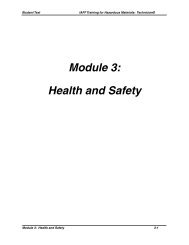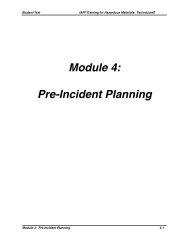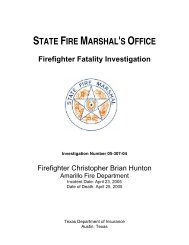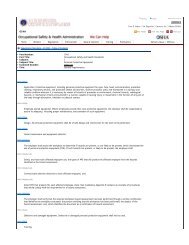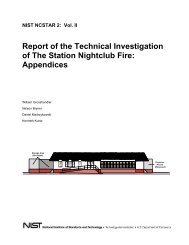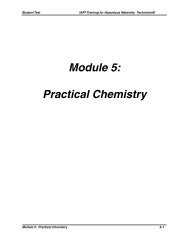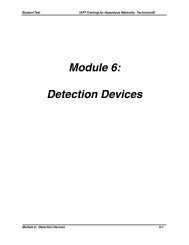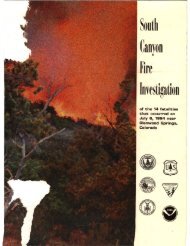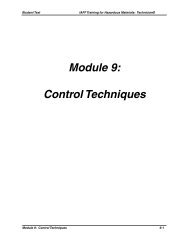Firefighter Autopsy Protocol - US Fire Administration - Federal ...
Firefighter Autopsy Protocol - US Fire Administration - Federal ...
Firefighter Autopsy Protocol - US Fire Administration - Federal ...
Create successful ePaper yourself
Turn your PDF publications into a flip-book with our unique Google optimized e-Paper software.
■ <strong><strong>Fire</strong>fighter</strong> <strong>Autopsy</strong> <strong>Protocol</strong><br />
■ 32 ■<br />
I: Background ■<br />
2. The second part covers the recent changes to the PSOB Act contained in Public Law 109–162, which<br />
provided a number of clarifying and conforming changes to the PSOB Act. New definitions included<br />
the term “member of a rescue squad or ambulance crew,” which is now defined as “an officially<br />
recognized or designated public employee member of a rescue squad or ambulance crew.” It also<br />
amended the PSOB Act to ensure that the pre-existing statutory limitation on payments to noncivilians<br />
referred to the individual who was injured or killed, and not to any potential beneficiaries. Finally, this<br />
legislation amended certain provisions of the PSOB Act regarding designation of beneficiaries when the<br />
officer dies without a spouse or eligible children and removed the need for a 1-year waiting period to<br />
ensure payment to the beneficiary of the officer’s “most recently executed life insurance policy.”<br />
3. The third part addresses the comments received by the Bureau of Justice Assistance (BJA) that relate<br />
to the proposed provisions implementing the Hometown Heroes Act, and explains the changes being<br />
made in the final rule.<br />
4. The fourth part is a specific discussion of the terms “line of duty” and “authorized commuting.”<br />
5. The last part addresses the remainder of the comments in a section-by-section analysis, indicating<br />
where changes to provisions were made, or where the BJA determined no changes were necessary.<br />
IV.2 Summary of the Heart/Stroke Amendment 27<br />
The Hometown Heroes Survivors Benefits Act of 2003 (HHA) amends the PSOB Act and was signed into<br />
Law on December 15, 2003. If a public safety officer dies as a direct and proximate result of a heart attack<br />
or stroke, that officer shall be presumed to have died as the direct and proximate result of a personal injury<br />
sustained in the line of duty unless such presumption is not overcome by competent medical evidence to<br />
the contrary.<br />
The law requires that the officer, while on duty engaged in a situation, and such engagement involved<br />
nonroutine stressful or strenuous physical law enforcement, fire suppression, rescue, hazardous material<br />
response, emergency medical services (EMS), prison security, disaster relief, or other emergency response<br />
activity; or participated in a training exercise, and such participation involved nonroutine stressful or<br />
strenuous physical activity. Any claim for nonroutine stressful or strenuous physical activities will be<br />
excluded if such actions are of a clerical, administrative, or nonmanual nature.<br />
Further, the law requires that the officer must have died as a result of a heart attack or stroke suffered<br />
■ while engaging or participating in such activity as described above;<br />
■ while still on that duty after so engaging or participating in such an activity; or<br />
■ not later than 24 hours after so engaging or participating in such an activity.<br />
The HHA provision only covers deaths occurring on or after December 15, 2003. The HHA is not<br />
retroactive, and therefore it does not apply to deaths that occurred before the aforementioned date.<br />
27<br />
from Summary of the federal (u.S.) Benefits for Public Safety Officers PSOB and PSOeA Programs,iAff Division of<br />
Occupational health Safety and Medicine, www.iaff.org


